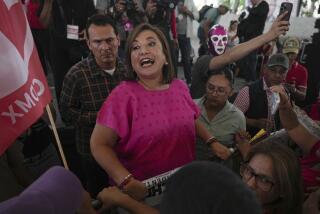Direction of U.S. Foreign Policy
- Share via
President Marcos is ready to hold a presidential election in January, well ahead of the scheduled mid-1987 vote, because he feels that he has successfully intimidated his constituents through the use of his so-called military police, eliminated many of his opponents, and three months is not enough time for the opposition to unite to make a strong rally.
Marcos deems himself as a savior and a righteous leader of his people but the mysterious killings and his untethered use of the military police stress a different philosophy. Why is Marcos imposing martial law and using his military police to quell resentment among the denizens? Communism is his alibi for the dismantling of democratic institutions and consolidating his personal rule. All social and political criticisms are viewed as sympathy for communism.
The Philippines is the only nation that we have ever governed as our colony. We do not want to make another mistake of Central America where blind support is given to any regime, regardless of how oppressive, racist or tyrannical, provided the ruling order fervently denounces communism and agrees to give us what we want in the way of economic and military concessions--for example, Fulgencio Batista in Cuba, the Somoza dynasty in Nicaragua, Chile’s Augusto Pinochet, and Paraguay’s Alfredo Stroessner.
The time is long overdue for the United States to begin using our considerable influence--independently of the Marcos government, if necessary--to help rebuild democratic institutions that will ensure badly needed military reforms, free elections, and basic human rights. This is the time and place to take some risks, and the United States must stand up for the values it believes in because this may well be the test that shows whether democracy has a chance to flourish in the Third World.
Influences toward economic reform could be done by withholding $453 million, by the International Monetary Fund, in loans to the Marcos government. Pressure from the United States has already succeeded in focusing attention on the crucial issues of succession and institutional change, and that more could be accomplished if U.S. policy-makers are not afraid to use our leverage in East Asia.
TRUONG LE
Los Angeles
More to Read
Sign up for Essential California
The most important California stories and recommendations in your inbox every morning.
You may occasionally receive promotional content from the Los Angeles Times.













